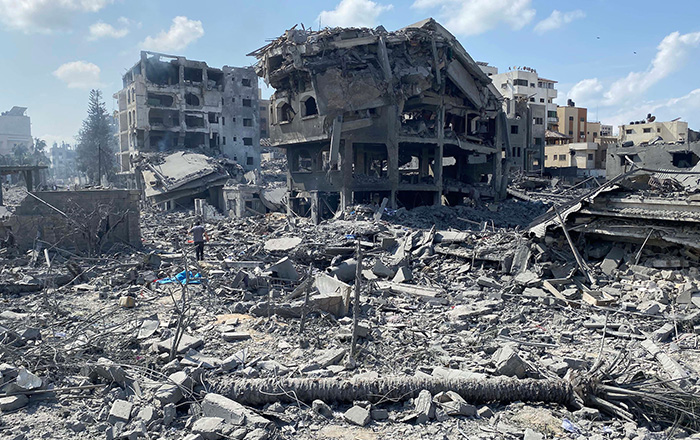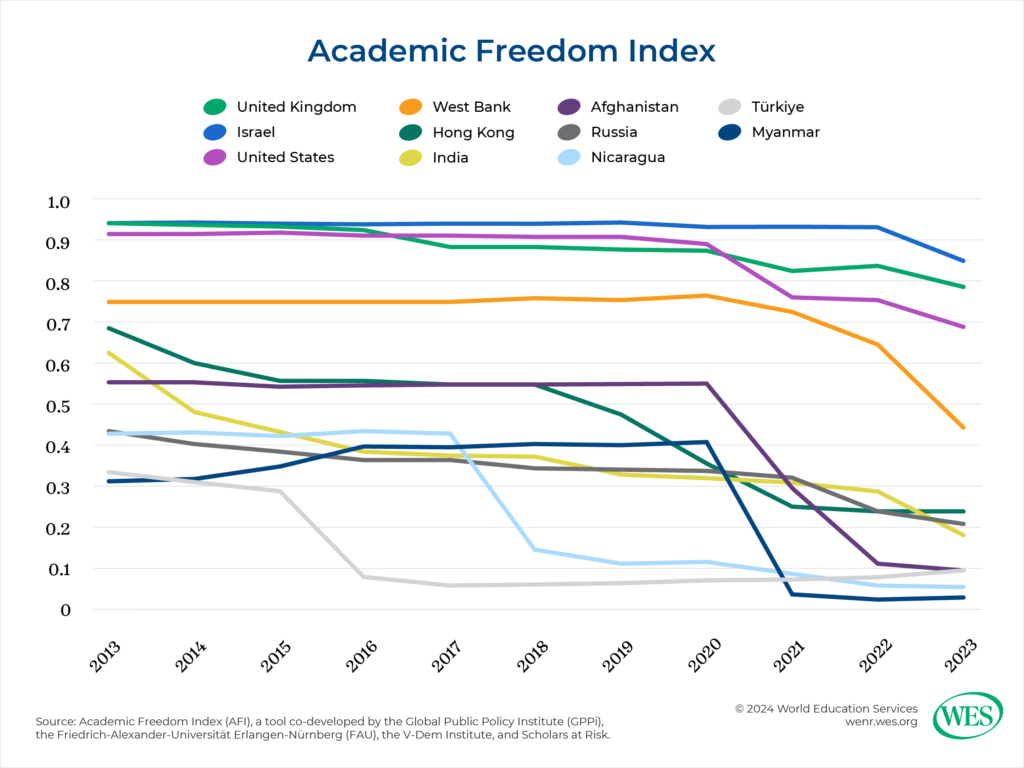Fleeing Attacks on Academic Freedom, Scholars Look to North America for Refuge

Since October 2023, many academic institutions in Gaza have been destroyed, upending the lives of countless students and educators.
The rise in threats to academic freedom globally is likely to drive a new wave of academic migration, particularly toward North America. As highlighted in Scholars at Risk’s Free to Think 2024 report, escalating pressures—from political crackdowns to violence linked to armed conflicts—are pushing scholars, students, and institutions into increasingly precarious situations. These growing dangers may compel more academics to seek refuge in regions where academic freedom is better protected and valued.
This year, the report documented 391 attacks on the global academic community, including extrajudicial killings, forced disappearances, and wrongful imprisonment. These assaults, often aimed at silencing scholars for their political dissent in teaching, research, or writing, have destabilized academic environments in many countries.
“Violent attacks in the context of armed conflict—including the closure or takeover of higher education institutions and confiscation of university resources—along with crackdowns on dissent in the form of arrests, detention, and prosecution, are two significant forms of attacks on higher education that push scholars and students to flee their homes,” Amy Kapit, senior program officer for advocacy at Scholars at Risk (SAR) wrote in an email.
North America, particularly the United States and Canada, has become a key destination for these displaced academics, offering safe environments and opportunities to continue their work.
Rising and Diverse Threats to Academia
The Free to Think 2024 report highlights an alarming global surge in attacks on higher education institutions, underscoring how university campuses have increasingly become sites of political tension and repression. Scholars and students worldwide face significant retaliation, often for expressing dissenting views in their teaching, research, or even social media.
“While there are some similarities, the driving factors in each country vary and generally are not singular,” said Rose Anderson, Director for Protection Services at SAR.
The report highlights specific incidents around the world. In the Middle East, the violent conflict between Israel and Hamas has severely impacted education, particularly in Gaza. By September 2024, Israeli military strikes had killed over 40,000 Palestinians and devastated the territory’s civilian infrastructure, destroying every one of its universities. The West Bank also experienced major educational disruptions due to military checkpoints, hindering access for Palestinian students and academics. Israeli universities were affected as well, facing challenges from military calls-to-service and increasing divisions between Jewish Israeli and Arab Israeli students.
In Sudan, a civil war that began in April 2023 has strangled higher education. More than 100 universities have been destroyed, either intentionally or through looting, halting nearly all academic activities. Similarly, Ukraine’s education sector has suffered greatly from Russian shelling, which damaged one in five universities, though students and academics have continued their work despite the devastation. (Read related article, Mired in War, Ukraine Starts a New Academic Year.)
In Myanmar, resistance to the military coup has led to a 90 percent drop in university enrollment as students joined nonviolent and armed resistance movements, isolating the country’s academic system.
The report also reveals state crackdowns on academic dissent in various countries. In Nicaragua, professors and students continue to be arrested for criticizing the government. In Iran, over 700 students have been detained for their involvement in the protests which broke out following the death of Mahsa Amini in police custody, to demand full civil and political rights for all Iranians, including women. Similarly, in Mali, an economist was sentenced to prison for allegedly defaming the state, while in Bangladesh, police repression of student protests resulted in over 200 deaths and thousands of arrests.
Authoritarian regimes have also used universities to silence dissent. In Russia, higher education institutions have fired academics who oppose the government, a pattern that intensified after the invasion of Ukraine. Chinese universities have dismissed scholars for commenting on foreign relations, and in Hong Kong, a historian of the 1989 Tiananmen Square massacre who had foreign affiliations was fired after being denied a visa.
The report draws attention to legislative and policy changes further eroding academic autonomy. The Taliban in Afghanistan has imposed restrictions on educational content, mandating that institutions align with Sunni Hanafi jurisprudence. In China, the formal merging of universities’ independent administrative offices with state-led Communist Party committees has undermined institutional autonomy. Also, the state tightly controls academic work, especially on politically sensitive topics.
These trends highlight a global pattern of repression against academic freedom. “Those attacks that put scholars’ and students’ lives at risk or make it impossible for them to continue in their profession, or with their education, are those that are most likely to force them to leave their homes,” Kapit said.
Shielding and Sheltering
These patterns of violence, repression, and displacement in various countries highlight the urgent need to protect academic freedom and provide refuge for scholars in peril. SAR is one of the organizations working toward a solution.
“Through SAR’s Protection work, scholars are matched with the host institutions across our global network of higher education institutions, which can invite scholars for short-term, temporary positions where these scholars have the opportunity to continue their research and/or teaching in safety,” Anderson explained, pointing out that the organization is currently seeking opportunities for more than 60 scholars, many of whom are from the countries and situations referenced in Free to Think 2024.
“Once we arrange a position for a scholar, SAR then advises the scholar and institutional host throughout the process, from arrival steps and logistics to working with scholars to plan their next steps post-SAR placement,” she said.
According to Anderson, SAR has received applications from Iran and Türkiye for many years, primarily driven by the targeting of scholars for their exercise of free expression. In Iran, a significant factor has been the increased targeting of scholars supporting women’s and human rights, particularly since 2022, when the Woman, Life, Freedom movement gained momentum. Iranian academics have faced repercussions not only for their activism but also for their research collaborations across borders.
In Türkiye, since 2016, SAR has seen applications from scholars unable to pursue their academic work due to legal charges stemming from their participation in the “We will not be a party to this crime” petition, which called on the government to end military operations in the country’s Kurdish regions. Many have also faced scrutiny related to their perceived affiliations with the Gulenist movement, a religious movement accused by the government of spearheading a failed coup attempt in 2016. Some of these individuals are seeking pathways back into academia after experiencing wrongful imprisonment.
Since Russia’s 2022 invasion of Ukraine, SAR has also received applications from scholars who fled the conflict and are now looking for academic positions abroad as they cannot return home. In Afghanistan, recent applicants have reported facing threats due to their work in support of human rights and women’s rights, as well as for collaborating with Western countries. Additionally, SAR receives applications from Afghan women who wish to continue their academic careers and contributions outside the country, as their educational opportunities have been severely restricted by the Taliban. (Read related article: Caught in the Cross Fire: The Battle for Girls’ Education in Conflict Zones Rages On.)
A Duty to Respond
Countries and universities that value academic freedom have a duty to respond to the rising numbers of academic refugees. In Canada and the U.S., desired destinations for many displaced scholars, colleges, and universities have already taken some steps to welcome displaced scholars.
“We have seen a significant response in the U.S. and Canada at the institutional level, with many institutions creating their own dedicated hosting programs in response to a high number of Afghan and Ukrainian scholars in particular coming to North America,” said Anderson, citing the Disrupted Ukrainian Scholars and Students Initiative launched at the University of Alberta and the Artists and Scholars at Risk program at Carnegie Mellon University as examples.
However, while many institutions have established programs to support academics fleeing conflict zones, the sheer number of scholars seeking refuge far exceeds the available resources.
According to Anderson, “many institutions want to invite threatened scholars but lack available resources to do so—in some cases, these are institutions that have hosted scholars from Afghanistan and Ukraine starting in 2021/22, and now have too-stretched resources to invite additional scholars to campus.”
In addition to funding, other top needs identified by SAR members include streamlined visa processes and a more coordinated national response to ensure that these scholars can not only arrive but also thrive in their new academic environments.
“In the U.S. we have seen Afghan scholars denied visas or made to wait through months-long ‘administrative processing’ checks, and in Canada, the visa wait times stretch to many months from initial application; both scenarios leave scholars and their families to wait in uncertain situations until their visa is granted and demonstrate the need for improvements to visa processing,” Anderson revealed.
In turn, because attacks on higher education stifle intellectual inquiry and the free exchange of ideas, Kapit believes that government and higher education leaders in North America must respond forcefully to prevent the erosion of democratic values.
“We urge intergovernmental, state, and higher education leaders to publicly affirm the significance of academic freedom and acknowledge the global attacks on higher education,” she said. “Additionally, we call on intergovernmental bodies, donors, and higher education leaders to collaborate with SAR and partner institutions to create opportunities for at-risk scholars worldwide.”
